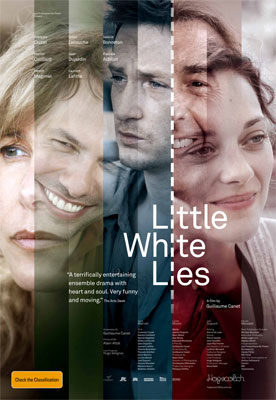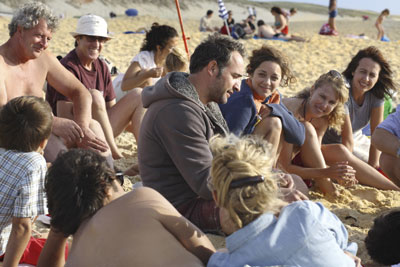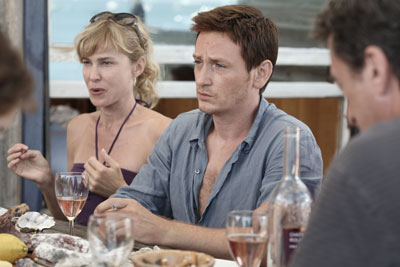Guillaume Canet Little White Lies Interview

Guillaume Canet Little White Lies Interview
Cast: Francois Cluzet, Marion Cotillard, Benoit Magimel, Gilles Lellouche, Jean Dujardin, Laurent Lafitte, Valerie Bonneton, Pascale Arbillot, Anne Marivin, Louise Monot, Joel Dupuch, Hocine MerabetDirector:Guillaume Canet
Genre: Comedy, Drama
Running Time: 154 minutes
Synopsis: Guillaume Canet has assembled an outstanding cast of some of France's finest actors - headed by Academy Award-winning Marion Cotillard - to make an entertaining and finely observed drama that brilliantly walks the line between laughter and tears.
A group gathering is hosted every year by a couple at their beautiful beach house where they kick-off their summer vacation by celebrating the birthday of one of the gang. Fun, fine wine and seafood mix with sun and sand as they all leave their city stresses and inhibitions behind. But this year is different. One of them is badly injured in a serious motorcycle accident just as they are about to leave Paris for their seaside reunion. His friends flock to his bedside, where their unconscious pal is still alive but in intensive care. What to do? Stay in Paris to be by his side, or leave for their vacation having been assured that there is nothing they can do? By the time they return he should be conscious and up for visitors.
After some intense discussion, they decide to head off for enjoyment and relaxation. Over the course of the next week, all the tensions within this group erupt into full daylight. Through a succession of incidents, the group is pulled apart and dragged together by their ties of loyalty and marriage. Their relationships, convictions, sense of guilt and friendship are sorely tested. They are finally forced to own up to the little white lies they have been telling each other.
Little White Lies - Release Date: 16th June, 2011
Directors Statement
Little White Lies is my third feature as a director and the most personal of the three. For this reason, I insisted on writing it alone and the process was uniquely intense. I say that it's a personal film because the subject matter is particularly close to me. It's close to people of my generation while resonating with younger and older people. Deceiving yourself comes very easy. It allows you to convince yourself you're right, to bury or shelve issues that are too painful to confront. It's when we develop the annoying, self-defeating habit of telling "little white lies".
This film talks about people who have accepted their life, job or sexuality without ever wondering if it's really what they want from life or if they really are happy in their relationship.
Through cowardice, force of habit or fear of the unknown, we often go through life without tackling these issues, without listening to our instincts or convictions and, above all, without listening to what our heart tells us.
The importance of learning to listen is what I wanted to show through the characters in the film. They all have a weakness, a lie they've buried and don't want to own up to.
An awful incident, like the one they are confronted with, forces them to face up to their lies.
I wanted to set this story in an atmosphere of comedy and friendship. But comedy underpinned with seriousness, and so with important nuances in the tone of the film as we switch from almost slapstick scenes to others that are, I hope, very touching.
I grew up with movies like Lawrence Kasdan's The Big Chill, John Cassavetes' Husbands and Yves Robert's Nous irons tous au paradis. They continue to be a source of inspiration, not just in their humor, but also in the sincerity their characters exude.
That's why, in this movie, I wanted to be as credible as possible in the portrait of friendships, for that credibility to fill every scene. Casting the movie, I chose people I like and admire, who share one vital qualification for being in the film-they all know each other.
I insist on the fact that it's a personal film because it's so close to me. Either I see myself in the characters or I've met people just like them.

Interview with Guillaume Canet
Question: You seem in a state of heightened emotion...Guillaume Canet: Yes, it's very strange. I've never felt like this before about a movie I directed. I've made two shorts and three features, including Little White Lies, which isn't a lot but enough to be able to say that from the beginning this movie has been very special for me.
Question: Apparently, after Tell No One, you had quite a turbulent time personally. Is that what led you to write Little White Lies?
Guillaume Canet: Turbulent, maybe not, but I experienced what you could call a crucial period in my life, for sure. After Tell No One, I went through several different stages, due to my age partly. At 35, you don't look at things the same way as when you're 20, you've already taken a few knocks. I decided to enter a process of analysis-a fairly time-consuming process that was more productive than I could ever have imagined because it resulted in me writing this script in under five months. That's what makes the movie so special for me. I cannot make a more personal movie than Little White Lies.
Question: What triggered this process of analysis?
Guillaume Canet: Realising how much I'd deceived myself over the years about what I really wanted, and how much energy I'd devoted to my work to avoid having to think about things. It was convenient to close my eyes to bothersome personal issues I didn't want to acknowledge. The tipping-point came when I was finishing Tell No One. I got sick. Shooting and editing the movie had taken so much out of me that I picked up the first virus going. It developed into septicemia and I spent a month in the hospital. When I got out, I went straight into a good old depression. I eventually realised that my whole existence couldn't begin and end with my work and that I was allowed to take the time to enjoy life. The film shows the damage feelings of guilt can cause...
I have a relationship with guilt that most likely comes from my childhood-the major and minor dramas that occur at that age. When I realised that, I had to drive it all out and that made me feel so much better. I can't admit to making such a personal movie without admitting publicly that I went through that stage.
Question: What were the initial benefits?
Guillaume Canet: I realised a bunch of things that allowed me to focus on what I really wanted. I realized which friends really counted for me. I straightened out my life.
Question: And the idea for Little White Lies began to take shape?
Guillaume Canet: Summer 2008, I began to play around with the idea while I was working on another screenplay totally unconnected to my inner turmoil of that time. I was sharing a house with a friend for a few days and I started throwing out stuff that was buzzing around my head, especially the fact that I'd always wanted to make a "friends movie." The more I talked, and the more she listened, I realized that in fact a film was being born. I asked my friend to be my midwife for the next five days. She listened, asked questions, reacted, and I'd take notes. I owe her so much because right away I had the structure of the movie. I scribbled scenes down in my trailer on the set of Farewell as soon as I had some time between takes. Writing had never come so easy to me.
Question: Is it fair to say there's a little of you in each character?
Guillaume Canet: Yes, a little bit in each. A lot of what's said in the movie comes from my life. Afterwards, of course, it's reworked and fictionalized to become part of a story. Even so, writing the script of Little White Lies got quite painful because it dug so deep into personal experiences and made me relive so many emotions.
Question: The film has the audience constantly torn between crying and laughing.
Guillaume Canet: Yes, we walk a very fine line. Everybody's been in tragic situations where laughter suddenly breaks out. That's what I wanted to capture. The situation the characters find themselves in forces them through a whole range of emotions and feelings. I wanted to show how a vacation is often the chance to let off steam, and so provokes all kinds of reactions, some comic, some dramatic.
Question: When did you sense that everything had clicked together?
Guillaume Canet: Probably after the first table-read when François Cluzet said to me, pretty emotionally, You know, there's a bunch of scenes where you don't know whether to laugh or cry. I knew then I was on the right track.
Question: The film's central theme is lies...
Guillaume Canet: More specifically, the lies people tell themselves and, collaterally, each other-everything we don't want to see in ourselves, that we try to gloss over.
Question: At the beginning, the characters spend a lot of time dodging their real issues.
Guillaume Canet: Yes, like a lot of people at various points in their lives. Is this truly my dream job? Do I truly love the person I live with? Is my sexuality what I truly wanted? I don't use the word "truly" by chance. It's the key word. And those questions are relevant at any age.
Question: And the characters are so universal, it's easy to identify alternately with one then the other.
Guillaume Canet: That's what I was aiming for. I wanted to make a cross-generational movie. Even the children's characters are based on what I felt when I was 5-10 years old, surrounded by grown-ups. There's a lot of me in all of these characters. I approached writing them with a lot of honesty and sincerity, which I think is why people seem to relate to them easily. You always have to put something of yourself into a story. What's true and real for you, can be true and real for somebody else. At the very least, it's authentic because it's personal.
Question: What was the movie like to shoot?
Guillaume Canet: It was a very intense feeling but complicated because I wanted the actors to feel what I had felt when I was writing. I was pretty obsessive, asking them to say the lines exactly as I had imagined and written them. I've never thrown myself into a movie with such passion.
Question: You put a heap of passion into Tell No One...
Guillaume Canet: Tell No One is a movie I love, but I think Little White Lies is a more personal and accomplished movie that, without sounding pretentious, gives me a particular sense of pride. I find the characters particularly touching. They inspire that passion in me.
Question: It's also a film about friendship...
Guillaume Canet: I freely admit to drawing inspiration from great movies about groups of friends like The Big Chill (1984), which is probably the reference for me. There's also Jean-Marie Poiré's Mes meilleurs copains (1988) and Yves Robert's Un elephant ça trompe énormément (1976). Cassavetes' Husbands... And a stack of movies by Claude Sautet.
Question: Making a movie about a group of friends must be easier when you're working with real-life friends.
Guillaume Canet: Sure. Gilles (Lellouche), Marion (Cotillard) and the crew that's worked with me since my very first short films, we go back a long way now. Then there's François (Cluzet) and Benoît (Magimel)... Same goes for Jean Dujardin-we realised we'd been to kindergarten and primary school together when both our families lived in Les Yvelines, outside Paris. I'd completely forgotten that. He reminded me at the premiere of Mon idole (2002). Do you remember Mrs. Pichon? And Mrs. Copeck? No kidding I remembered them. We couldn't get over it!
 Question: So it's a film about a bunch of friends made with a bunch of friends, on whom you nonetheless made certain demands.
Question: So it's a film about a bunch of friends made with a bunch of friends, on whom you nonetheless made certain demands.Guillaume Canet: When I offered them each a part, there were two conditions. Prior to shooting in August, I asked them to keep open five days in May to immerse ourselves in Cap Ferret. That way, I got to take everybody to the house where we'd be shooting. I wanted them to live there, to open cupboards and know where the coffee was, the knives and forks, and so on. I wanted it to be ingrained, so that the boat trips would look natural, so that the beach restaurant would be familiar to them. When we went back to Cap Ferret in August, they already felt like they'd been there on vacation.
Question: You also wanted them to get to know each other...
Guillaume Canet: Exactly. So that the on-screen couples would take shape and they'd get to know the kids playing their children. The second condition was that I asked for everybody to be present throughout the shoot. I wanted them to stay there, to be part of the group 24/7, and to be available for improvised shots if the need arose. I didn't want the story to be acted out, I wanted them to live it.
Question: You used two cameras on set the whole time. Why?
Guillaume Canet: So that the actors would be as free as possible. So that, in group scenes, they could get up from the table to get a glass from the kitchen if they wanted without worrying about entering or leaving the frame. Then, in editing, I put the film together out of a vast amount of footage. To a certain extent, that's how I managed to make such a vibrant film with such rhythm. It was amazing how everybody got into the spirit of it and that's why this movie really touches me every time I see it. All the emotion I felt when I was writing the script comes flooding back.
Question: It also talks about missed opportunities...
Guillaume Canet: We all miss out on so much for the same reasons-you let your work and lifestyle get on top of you, you neglect your family, friends and relationships, while giving people the impression you're there. You know it's time to stop and think, to redefine your priorities and decide what you really want, but you don't necessarily take the time to do it, and when you finally get round to it, it may be too late. In the movie, some characters aren't able to talk about things and others talk too much because silence scares them...
You're always scared you'll wreck the atmosphere by raising certain issues that may be a bit sensitive, so you don't say anything. But you wreck the atmosphere anyway! You let it slide because you think things will work themselves out. The "little white lies" are the rug you sweep all the crappy stuff under, until eventually it begins to show. When it all comes out, it can be gruesome, as it is for some of the characters in the movie when they finally have to face the truth.
Question: The oyster-farmer plays a crucial role as the catalyst...
Guillaume Canet: Jean-Louis is the group's conscience, the guy who's not afraid to speak his mind. He's a man of integrity who lives a simple life. He's been observing them carefully, he likes them all and he has a big heart, but he won't give them an easy ride. He brings them face-to-face with their contradictions and their cowardice.
Question: He's played by Joël Dupuch, who is...
Guillaume Canet: A real-life oyster-farmer from Cap Ferret. And a friend. He's outstanding, pitch-perfect, a complete revelation! Gilles Lellouche plays the second-rate actor constantly making his life sound bigger and better than it is. He has to charm and seduce. He can't bear to show his flaws, feelings or pain, so he shows off. It's the easy way out.
Question: Is this your most polished movie?
Guillaume Canet: Technically and in terms of directing actors, I'd say so, yes. But all along, I kept realizing how much I still had to learn!
MORE
- Mission: Impossible Fallout
- Glenn Close The Wife
- Allison Chhorn Stanley's Mouth Interview
- Benicio Del Toro Sicario: Day of the Soldado
- Dame Judi Dench Tea With The Dames
- Sandra Bullock Ocean's 8
- Chris Pratt Jurassic World: Fallen Kingdom
- Claudia Sangiorgi Dalimore and Michelle Grace...
- Rachel McAdams Disobedience Interview
- Sebastián Lelio and Alessandro Nivola...
- Perri Cummings Trench Interview



